Related Research Articles

Sir James Edward Thornton Paice, DL is a British politician who was the Member of Parliament (MP) for South East Cambridgeshire from 1987 to 2015, when he declined to run for reelection and retired from politics. A member of the Conservative Party, he served as Minister of State at the Department for Environment, Food and Rural Affairs from 2010 until being removed in a government reshuffle in 2012. Following his service in government, Paice was knighted in September 2012.
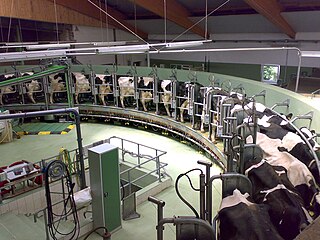
Dairy farming is a class of agriculture for the long-term production of milk, which is processed for the eventual sale of a dairy product. Dairy farming has a history that goes back to the early Neolithic era, around the seventh millennium BC, in many regions of Europe and Africa. Before the 20th century, milking was done by hand on small farms. Beginning in the early 20th century, milking was done in large scale dairy farms with innovations including rotary parlors, the milking pipeline, and automatic milking systems that were commercially developed in the early 1990s.
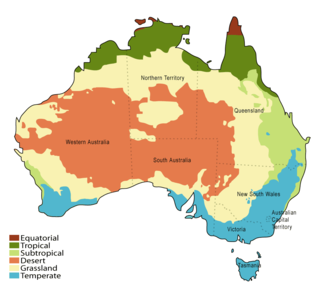
Although Australia is mostly arid, the nation is a major agricultural producer and exporter, with over 325,300 people employed in agriculture, forestry and fishing as of February 2015. Agriculture and its closely related sectors earn $155 billion a year for a 12% share of GDP. Farmers and grazers own 135,997 farms, covering 61% of Australia's landmass. Across the country, there is a mix of irrigation and dry-land farming. The success of Australia in becoming a major agricultural power despite the odds is facilitated by its policies of long-term visions and promotion of agricultural reforms that greatly increased the country's agricultural industry.
A marketing board is an organization created by many producers to try to market their product and increase consumption and thus prices. It can also be defined as an organization set up by a government to regulate the buying and selling of a certain commodity within a specified area. They most commonly exist to help sell farm products such as milk, eggs, beef or tripe and are funded by the farmers or processors of those crops or products. Marketing boards often also receive funding from governments as an agricultural subsidy. The leadership and strategies of the marketing boards are set through votes by the farmers who are members of the board.
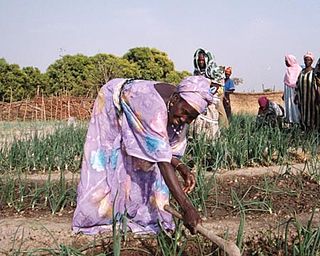
An agricultural cooperative, also known as a farmers' co-op, is a producer cooperative in which farmers pool their resources in certain areas of activities.
Yeo Valley is a British dairy company that was founded in 1961. The headquarters are in Somerset, United Kingdom. The Yeo Valley corporation is owned by the Mead family. In 2020, Yeo Valley Organic was the 48th biggest grocery brand in the United Kingdom and the third largest yogurt brand in the UK.

The National Farmers Organization (NFO) is a producer movement founded in the United States in 1955, by farmers, especially younger farmers with mortgages, frustrated by too often receiving crop and produce prices that produced a living that paid less than the minimum wage, and, too often, might not even cover the cost of seed, fertilizer, land, etc. This was despite the many hours that might be devoted by an entire family. This was despite mortgages having to be paid in years of drought or hail or other crop failure. It was despite too high injury rates related to lifting and to high mortality rates due to working with heavy, sharp equipment. Frustrated farmers, thus, tried to obtain better prices. At first the methods included withholding of commodities from sale. The early methods also included opposition to those coops unwilling to withhold goods from market. During protests, farmers might purposely sell food directly to neighbors instead of through the co-ops. They might also destroy food in dramatic ways, in an attempt to gain media exposure, for example, slaughtering excess dairy cows. A 1964 incident brought negative attention when two members were crushed under the rear wheels of a cattle truck. They did not succeed in obtaining a Canadian-style quota system. Methods, thus, are different now.
Uganda's favorable soil conditions and climate have contributed to the country's agricultural success. Most areas of Uganda have usually received plenty of rain. In some years, small areas of the southeast and southwest have averaged more than 150 millimeters per month. In the north, there is often a short dry season in December and January. Temperatures vary only a few degrees above or below 20 °C but are moderated by differences in altitude.

In New Zealand, agriculture is the largest sector of the tradable economy. The country exported NZ$46.4 billion worth of agricultural products in the 12 months to June 2019, 79.6% of the country's total exported goods. The agriculture, forestry and fisheries sector directly contributed $12.653 billion of the national GDP in the 12 months to September 2020, and employed 143,000 people, 5.9% of New Zealand's workforce, as of the 2018 census.
The 1933 Wisconsin milk strike was a series of strikes conducted by a cooperative group of Wisconsin dairy farmers in an attempt to raise the price of milk paid to producers during the Great Depression. Three main strike periods occurred in 1933, with length of time and level of violence increased during each one.

Nocton Dairies is a British company which was formed by Devon farmer and cheese-maker Peter Willes and Lancashire milk producer David Barnes in order to construct an 8,100-cow dairy at Nocton Heath in Lincolnshire, objectors to which claimed that it would have been the largest in Western Europe.
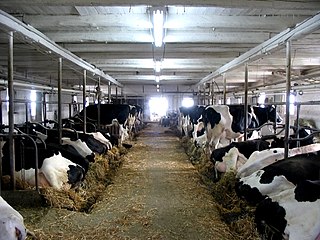
Dairy farming is one of the largest agricultural sectors in Canada. Dairy has a significant presence in all of the provinces and is one of the top two agricultural commodities in seven out of ten provinces.

Canada's supply management, abbreviated SM, is a national agricultural policy framework used across the country, which controls the supply of dairy, poultry and eggs through production and import controls and pricing mechanisms. The supply management system was authorized by the 1972 Farm Products Agencies Act, which established the two national agencies that oversee the system. The Agriculture and Agri-Food Canada federal department is responsible for both the Canadian Dairy Commission and its analogue for eggs, chicken and turkey products, the Farm Products Council of Canada. Five national supply management organizations, the SM-5 Organizations — Egg Farmers of Canada (EFC), Turkey Farmers of Canada (TFC), Chicken Farmers of Canada (CFC), the Canadian Hatching Egg Producers (CHEP) and the Ottawa-based Canadian Dairy Commission (CDC), a Crown corporation — in collaboration with provincial and national governing agencies, organizations and committees, administer the supply management system.
Animal Justice Project is a British animal rights organisation founded in 2014. The NGO advocates for an end to animal agriculture and promotes a vegan lifestyle, conducting undercover investigations on farms, in abattoirs, and places where animals are traded. The organisation claims to have delivered ‘many positive impacts, on thousands of animals’’ though its work.

Agriculture in Wales has in the past been a major part of the economy of Wales, a largely rural country which is part of the United Kingdom. Wales is mountainous and has a mild, wet climate. This results in only a small proportion of the land area being suitable for arable cropping, but grass for the grazing of livestock is present in abundance. As a proportion of the national economy, agriculture is now much less important; a high proportion of the population now live in the towns and cities in the south of the country and tourism has become an important form of income in the countryside and on the coast. Arable cropping is limited to the flatter parts and elsewhere dairying and livestock farming predominate.

Agriculture is a significant sector in Wisconsin's economy, producing nearly $104 billion in revenue annually. The significance of the state's agricultural production is exemplified by the depiction of a Holstein cow, an ear of corn, and a wheel of cheese on Wisconsin's state quarter design. In 2017 there were 64,800 farms in the state, operating across 14.3 million acres of land.

Animal Rising is a British animal activist movement with the stated aim of compelling social change towards animal rights and a plant-based food system. They justify their actions with the impact of animal agriculture on climate change, species extinction and ecosystem breakdown.
Dairy is a primary source of agricultural output in the state of Vermont. As of December 2021, the state had 568 dairy farms milking cattle, sheep, and/or goats which produced 2.5 billion pounds of milk annually. Vermont ranks 15th in the United States for raw milk production.

Dairy is a major industry in the state of Wisconsin. Being known for its dairy production, the state is often called "America's Dairyland." The industry is prominent in official state symbols—being displayed on the state's license plates, state's slogan, and on the state quarter.
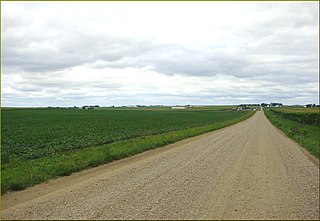
Farmers' suicides in the United States refers to the instances of American farmers taking their own lives, largely since the 1980s, partly due to their falling into debt, but as a larger mental-health crisis among U.S. agriculture workers. In the Midwest alone, over 1,500 farmers have taken their own lives since the 1980s. It mirrors a crisis happening globally: in Australia, a farmer dies by suicide every four days; in the United Kingdom, one farmer a week takes their own life, in France it is one every two days. More than 270,000 farmers have died by suicide since 1995 in India.